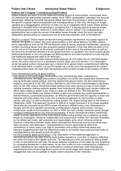Politics Unit 3 Notes Introducing Global Politics E.Highmore
Politics Unit 3 Chapter 1: Introducing Global Politics
States (nations) are taken to be the essential building blocks of world politics, once boiled down,
it is described as relationships between states, since 1980’s ‘globalisation’ paradigm has become
fashionable, reflecting the belief that global affairs have been transformed in recent decades by
the growth of global interconnectedness and interdependence, in this view, the world no longer
operates as a disaggregated collection of state, but as an integrated whole world. Global politics
attempts to straddle these rival paradigms, accepting that it is equally absurd to dismiss states
and national government as irrelevant in world affairs, what is ‘global’? Our understanding of
global politics has to take into account theoretical lenses through which the world has been
interpreted, global politics is ongoing and has an enduring character, what is the balance?
What’s in a name? Global means worldwide having planetary significance, not merely regional or
national, the globe is in effect the world, global politics in this sense refers to GLOBAL politics,
some organisations such as the UN has become close to having universal membership, a growing
number of political issues have also acquired a global character, in that they affect all parts of the
world, and so all the people on the planet, particularly in the case of the environment, as well as
the economy sometimes referred to as the global economy or capitalism, the trend towards global
interconnectedness is not only perhaps the defining feature of modern existence but also requires
that traditional approaches need to be rethought.
The notion that politics has been interconnected absorbs all of its parts into an indivisible global
whole, the notion that we live in a borderless world is dead, and only fanciful, in no meaningful
sense has global politics transcended say a national level, global means comprehensive referring
to all elements within a system, not just the system as a whole, from this perspective the advent
of global politics does not imply that international politics should consign to the dustbin of history.
From international politics to global politics:
• new actors on the world stage: world politics has conventionally been understood in
international terms, the larger phenomenon of patterns of conflict and cooperation between and
among territorially based political units has existed throughout history, the term international
relations came about in the 16th century, Bentham’s use of the term acknowledged a significant
shift, by the 18th century tfrrirotirally based political units were coming to have a more clearly
national character, making relations appear more international, although most modern states are
either nation states or aspire to be, what is a state, as defined in the 1933 Montevideo
Convention on the Rights and Duties of States a sate must possess four qualifying properties, a
defined territory, a permanent population, an effective government and the capacity to enter into
relations with other states, this is why the conventional approach to world politics is state
centric, and why it is often portrayed as a state system, the origins tracing back to the Peace of
Westphalia (1648). This approach however is difficult to sustain because it is no longer possible.
Transnational corporations and NGO’s exert influence in different ways, from Greenpeace to
Google, and the anti-capitalist movement, contributing to shaping world politics, having a
mixed-actor model of world politics, no TNC or NGO can rival a states corrective power though.
• increased interdependence and interconnectedness: to study international politics traditionally
meant to study implications of the international system being divided into a collection of states
thanks to sovereignty, viewed as independent and autonomous entities, this has been illustrated
as the billiard ball model, self contained and impermeable units, which influence external
pressure, interactions between states reflect assumptions that power and survival are primary
state concerns, with diplomacy>. Interdependence may be asymmetrical rather than
symmetrical, in which case it can lead to domination and conflict rather than peace and
harmony suggesting both that the billiard ball model is not entirely inaccurate and that levels of
interdependence vary greatly across the globe.
• the trend towards global governance: a key assumption of the traditional approach to
international politics has been that the state system operates in a context of anarchy, reflecting
the notion the state is the highest authority. The implications of this are profound forcing states
to rely on themselves for self help, the power seeking inclinations of one state are only tempered
by competing tendencies in other states, int his view conflict is only constrained by a balance of
power, reflecting the fact states are confronted by collective dilemmas, while international
organisations have become significant actors on the world stage, their impact shouldn't be
exaggerated, they are to a greater or lesser extent creatures of their members.




